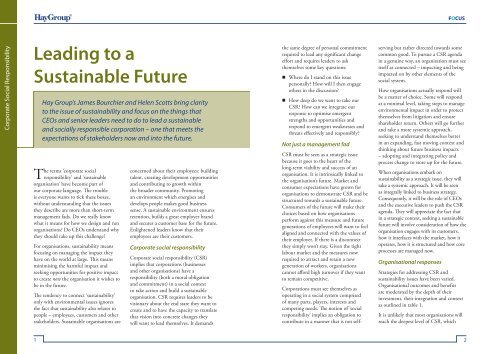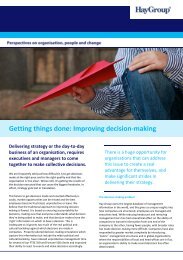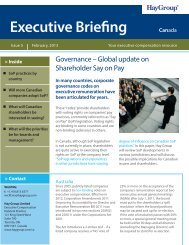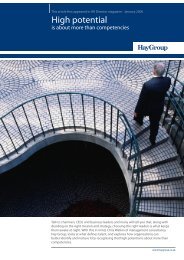Leading to a Sustainable Future - Hay Group
Leading to a Sustainable Future - Hay Group
Leading to a Sustainable Future - Hay Group
Create successful ePaper yourself
Turn your PDF publications into a flip-book with our unique Google optimized e-Paper software.
<strong>Hay</strong> <strong>Group</strong><br />
FOCUS<br />
Corporate Social Responsibility<br />
<strong>Leading</strong> <strong>to</strong> a<br />
<strong>Sustainable</strong> <strong>Future</strong><br />
<strong>Hay</strong> <strong>Group</strong>’s James Bourchier and Helen Scotts bring clarity<br />
<strong>to</strong> the issue of sustainability and focus on the things that<br />
CEOs and senior leaders need <strong>to</strong> do <strong>to</strong> lead a sustainable<br />
and socially responsible corporation – one that meets the<br />
expectations of stakeholders now and in<strong>to</strong> the future.<br />
The terms ‘corporate social<br />
responsibility’ and ‘sustainable<br />
organisation’ have become part of<br />
our corporate language. The trouble<br />
is everyone wants <strong>to</strong> tick these boxes,<br />
without understanding that the issues<br />
they describe are more than short-term<br />
management fads. Do we really know<br />
what it means for how we design and run<br />
organisations? Do CEOs understand why<br />
they should take up this challenge?<br />
For organisations, sustainability means<br />
focusing on managing the impact they<br />
have on the world at large. This means<br />
minimising the harmful impact and<br />
seeking opportunities for positive impact<br />
<strong>to</strong> create now the organisation it wishes <strong>to</strong><br />
be in the future.<br />
The tendency <strong>to</strong> connect ‘sustainability’<br />
only with environmental issues ignores<br />
the fact that sustainability also relates <strong>to</strong><br />
people – employees, cus<strong>to</strong>mers and other<br />
stakeholders. <strong>Sustainable</strong> organisations are<br />
concerned about their employees: building<br />
talent, creating development opportunities<br />
and contributing <strong>to</strong> growth within<br />
the broader community. Promoting<br />
an environment which energises and<br />
develops people makes good business<br />
sense. A sustainable environment ensures<br />
retention, builds a great employer brand<br />
and secures a cus<strong>to</strong>mer base for the future.<br />
Enlightened leaders know that their<br />
employees are their cus<strong>to</strong>mers.<br />
Corporate social responsibility<br />
Corporate social responsibility (CSR)<br />
implies that corporations (businesses<br />
and other organisations) have a<br />
responsibility (both a moral obligation<br />
and commitment) in a social context<br />
<strong>to</strong> take action and build a sustainable<br />
organisation. CSR requires leaders <strong>to</strong> be<br />
visionary about the end state they want <strong>to</strong><br />
create and <strong>to</strong> have the capacity <strong>to</strong> translate<br />
that vision in<strong>to</strong> concrete changes they<br />
will want <strong>to</strong> lead themselves. It demands<br />
the same degree of personal commitment<br />
required <strong>to</strong> lead any significant change<br />
effort and requires leaders <strong>to</strong> ask<br />
themselves some key questions:<br />
• Where do I stand on this issue<br />
personally? How will I then engage<br />
others in the discussion?<br />
• How deep do we want <strong>to</strong> take our<br />
CSR? How can we integrate our<br />
response <strong>to</strong> optimise emergent<br />
strengths and opportunities and<br />
respond <strong>to</strong> emergent weaknesses and<br />
threats effectively and responsibly?<br />
Not just a management fad<br />
CSR must be seen as a strategic issue<br />
because it goes <strong>to</strong> the heart of the<br />
long-term viability and success of an<br />
organisation. It is intrinsically linked <strong>to</strong><br />
the organisation’s future. Market and<br />
consumer expectations have grown for<br />
organisations <strong>to</strong> demonstrate CSR and be<br />
structured <strong>to</strong>wards a sustainable future.<br />
Consumers of the future will make their<br />
choices based on how organisations<br />
perform against this measure and future<br />
generations of employees will want <strong>to</strong> feel<br />
aligned and connected with the values of<br />
their employer. If there is a disconnect<br />
they simply won’t stay. Given the tight<br />
labour market and the measures now<br />
required <strong>to</strong> attract and retain a new<br />
generation of workers, organisations<br />
cannot afford high turnover if they want<br />
<strong>to</strong> remain competitive.<br />
Corporations must see themselves as<br />
operating in a social system comprised<br />
of many parts, players, interests and<br />
competing needs. The notion of ‘social<br />
responsibility’ implies an obligation <strong>to</strong><br />
contribute in a manner that is not self-<br />
serving but rather directed <strong>to</strong>wards some<br />
common good. To pursue a CSR agenda<br />
in a genuine way, an organisation must see<br />
itself as connected – impacting and being<br />
impacted on by other elements of the<br />
social system.<br />
How organisations actually respond will<br />
be a matter of choice. Some will respond<br />
at a minimal level, taking steps <strong>to</strong> manage<br />
environmental impact in order <strong>to</strong> protect<br />
themselves from litigation and ensure<br />
shareholder return. Others will go further<br />
and take a more systemic approach,<br />
seeking <strong>to</strong> understand themselves better<br />
in an expanding, fast moving context and<br />
thinking about future business impacts<br />
– adopting and integrating policy and<br />
process change <strong>to</strong> s<strong>to</strong>re up for the future.<br />
When organisations embark on<br />
sustainability as a strategic issue, they will<br />
take a systemic approach. It will be seen<br />
as integrally linked <strong>to</strong> business strategy.<br />
Consequently, it will be the role of CEOs<br />
and the executive leaders <strong>to</strong> push the CSR<br />
agenda. They will appreciate the fact that<br />
in a strategic context, seeking a sustainable<br />
future will involve consideration of how the<br />
organisation engages with its cus<strong>to</strong>mers,<br />
how it interfaces with the market, how it<br />
operates, how it is structured and how core<br />
processes are managed now.<br />
Organisational responses<br />
Strategies for addressing CSR and<br />
sustainability issues have been varied.<br />
Organisational outcomes and benefits<br />
are moderated by the depth of their<br />
investment, their integration and context<br />
as outlined in table 1.<br />
It is unlikely that most organisations will<br />
reach the deepest level of CSR, which<br />
156<br />
572

















